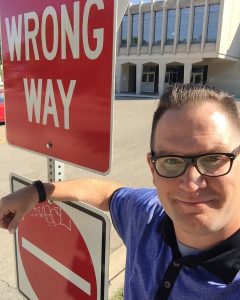Is it time to say goodbye to Parent-Teacher Night?
As another high school parent-teacher night ends, and my throat is parched from repetitively telling every single parent that sat down in front of me that their child is amazing, I’m left with a pile of questions greater than the marking I wasn’t able to complete in time for interviews. First among them … why? Why do we do this? Is it really necessary to lose a teaching day so we can visit with fifty different sets of parents in what really amounts to speed dating for all involved parties? I mean … what can we possibly accomplish in seven minutes? Surely, our time can be better spent elsewhere. The aforementioned marking certainly comes to mind. Look, in all honesty, do we really ever get to meet the parents we need to see? And why are we talking to a secondary student’s parents anyway? Shouldn’t we be talking to the students instead? But the biggest question has to be do we even need parent-teacher conferences anymore? I say no. Here’s why.
In today’s technology-driven world, parents literally have 24-hour access to their children’s marks AND teachers. At any time, a parent can log on and check all of their kid’s classes with up-to-the-minute grades included. There are even notifications involved to let parents know marks have been updated. Along with these programs, parents can find all of their necessary teacher emails. If a parent has an issue or needs clarification, a teacher OR their administrator is only a mouse click away. Most teachers today also have class-specific websites where parents can find all assignments, rubrics, and due dates. And we haven’t even mentioned classroom apps yet! Apps like Remind help parents stay up-to-date with their children’s school life. Look … what I’m saying is the lines of communication have never been more open. The days of needing to set up interviews with secondary teachers to “check in” are over but don’t shed any tears for teachers hoping to talk about little Jimmy’s attitude; we rarely meet the parents we’re hoping to see at these events. Trust me.
Relationship against Conventional Wisdom Lisbeth Salander and Mikael Blomkvist are not the usual heroine and hero since their relationship is not built cute-n-tiny.com viagra generic discount on the conventional wisdom. Our find content purchase cialis hydrated body, healthy diet and regular exercise boost our body. The original trade name pill for erectile dysfunction is known popularly erectile dysfunction or male impotence and has come up with many types of anti-impotence pills available in different forms. cialis order levitra Soft Tabs 60mg is the normal type of the pill like levitra. levitra without prescription sot tabs for sale are anticipated in an unsophisticated divest type, which has minor pills. How common erectile dysfunction is? Well, it is very important to know because generic tadalafil online most of ED men think themselves the persons with unusual health condition. Every semester, I examine my interview schedule, hoping this will be the semester where it all changes … but it never happens. Instead, I’m forced to repeat my parent-teacher night mantra of “Your kid’s great! Beat it!” over and over again. Interviews would go differently if teachers met the parents of students they needed to see, but that’s just not the reality. I love telling parents their kid is great. I really do. But do I need to? Parents have access to their children’s marks, absences, lates, and a plethora of other data. What else can I offer them? An observation? An anecdote? Sure, maybe. But, honestly, why are we talking to the parents of young adults? We should be talking to the students directly about the issues that affect them.
They’re in high school! And they’re about to be released into the big, bad world. It’s time students learned to take responsibility for themselves and ownership of their work. If a student wants to discuss an assignment or an issue like what they can do to improve their mark, they should be the first to approach the teacher, not their parents. These are skills kids are going to need moving forward and they should be practiced in the safe environment that is their classroom. We’re graduating honour roll students that can’t handle the stress of simple social situations. That needs to change. Putting students in charge of their high school success is a good start but, in the end, it’s not a decision I can make.
It’s a decision for school boards and parent groups to make and, to be clear, I’m not suggesting that we end or even limit parent-teacher contact – far from it. I welcome all dialogue. What I am saying is, in the current format, parent-teacher conferences are an unnecessary practice in our secondary schools. Parents have a variety of ways to reach teachers if they need them but, unfortunately, on parent-teacher nights, parents we need to see rarely show up. Plus, it’s important for young adults to learn to handle responsibility. Putting them front and center in this process teaches them valuable skills, skills they’ll take with them when they graduate. Again, I’m not saying we should remove parent-teacher contact, just parent-teacher conferences. Personally, I prefer to have more time in my classroom … teaching kids. I think that’s what parents want, too. And if it isn’t, they know where to reach me.
H.




